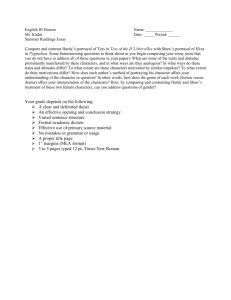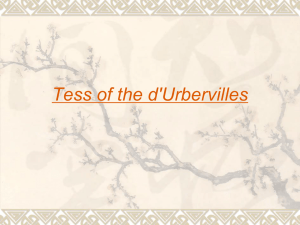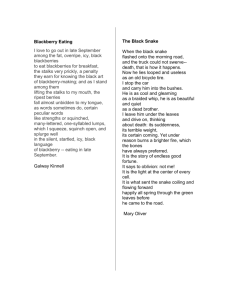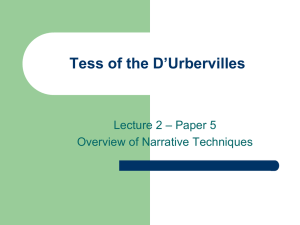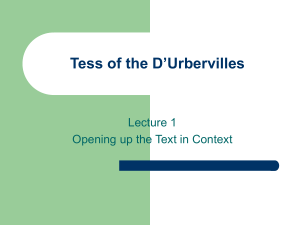Tess in Thomas Hardy's Tess of the D'Urbervilles
advertisement
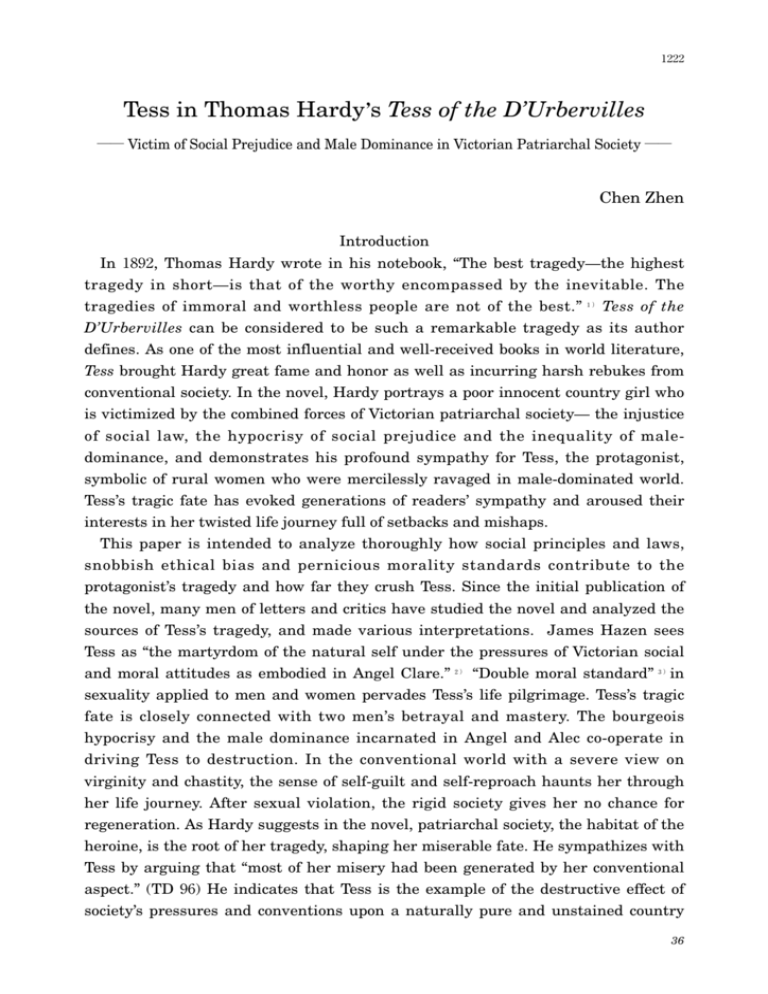
1222 Tess in Thomas Hardy, s Tess of the D’Urbervilles ―― Victim of Social Prejudice and Male Dominance in Victorian Patriarchal Society ―― Chen Zhen Introduction In 1892, Thomas Hardy wrote in his notebook, “The best tragedy—the highest tragedy in short—is that of the worthy encompassed by the inevitable. The tragedies of immoral and worthless people are not of the best.” 1) Tess of the D’Urbervilles can be considered to be such a remarkable tragedy as its author defines. As one of the most influential and well-received books in world literature, Tess brought Hardy great fame and honor as well as incurring harsh rebukes from conventional society. In the novel, Hardy portrays a poor innocent country girl who is victimized by the combined forces of Victorian patriarchal society— the injustice of social law, the hypocrisy of social prejudice and the inequality of maledominance, and demonstrates his profound sympathy for Tess, the protagonist, symbolic of rural women who were mercilessly ravaged in male-dominated world. Tess’s tragic fate has evoked generations of readers’ sympathy and aroused their interests in her twisted life journey full of setbacks and mishaps. This paper is intended to analyze thoroughly how social principles and laws, snobbish ethical bias and pernicious morality standards contribute to the protagonist’s tragedy and how far they crush Tess. Since the initial publication of the novel, many men of letters and critics have studied the novel and analyzed the sources of Tess’s tragedy, and made various interpretations. James Hazen sees Tess as “the martyrdom of the natural self under the pressures of Victorian social and moral attitudes as embodied in Angel Clare.” 2) “Double moral standard” 3)in sexuality applied to men and women pervades Tess’s life pilgrimage. Tess’s tragic fate is closely connected with two men’s betrayal and mastery. The bourgeois hypocrisy and the male dominance incarnated in Angel and Alec co-operate in driving Tess to destruction. In the conventional world with a severe view on virginity and chastity, the sense of self-guilt and self-reproach haunts her through her life journey. After sexual violation, the rigid society gives her no chance for regeneration. As Hardy suggests in the novel, patriarchal society, the habitat of the heroine, is the root of her tragedy, shaping her miserable fate. He sympathizes with Tess by arguing that “most of her misery had been generated by her conventional aspect.” (TD 96) He indicates that Tess is the example of the destructive effect of society’s pressures and conventions upon a naturally pure and unstained country 36 1221 Tess in Thomas Hardy’s Tess of the D ’ Urbervilles girl and that Alec and Angel are personifications of destructive attitudes towards women. On May 5, 1889, Hardy wrote, “That which, socially is a great tragedy, may be in Nature no alarming circumstance.” 4) “Victorian society exacerbates an age-old harsh and hypocritical definitions of virtue and exhortations for maidens to conform.” 5) As the sacrifice of ethical prejudice, Tess is victimized by Victorian society, whose law she is driven to break and from whose moral codes she is alienated. Tess’s behavior deviates from conventional Victorian norms, which regard her as an intruder into the society and offender against the socially accepted moral standards and conduct norms. Victorian male dominance as an accessory also plays an indispensable role in victimizing the protagonist. The male dominated world sacrifices Tess, for she violates the conventions which are in favor of male superiority and dominance over women. In such a severe society, Tess, a paganism-conformer, who is following the natural law, is destined to tragedy. Tess is designated as a “fallen” woman who is disdained and refused by the social community. Her deviation from the wellaccepted ethical restrictions for women decides her tragic destination. This is the inevitability of her tragedy. Hardy witnesses the injustice of social law and the ill effect of male-dominance over women and dramatizes them in the novel through the miserable life of Tess who is crushed by the comprehensive vicious power of society. In the perspective of the conventional world, Tess is an unforgivable sinner whose “terrible sins” are doomed; however, Hardy, cherishing “a thousand pities” (TD 95) for Tess, calls her a pure woman. This is the irony against the hypocritical conventions of the Victorian Age, which restricted man’s nature to such a large extent as it oppressed people, especially women, who were trodden at the bottom of society. Tess is driven to offend the social law, but she responds to the natural law, to her nature. Her sexual involvement is normal in natural law, but she has to face the prejudice of severe social codes and respond with rebellion. Tess is naturally pure if she is socially “degraded”. Perry Meisel indicates that “The confrontation within man of his natural and social components, a confrontation that is tragic when recognized selfconsciously, is the psychological battleground of Hardy’s last, and probably greatest, novels.” 6) The most noticeable point is the subtitle, which is undoubtedly the overt challenge to the social conventions in Victorian society. “A pure woman” is such a phrase with so much implication and irony that it caused uproar and a sufficient amount of controversy when the novel was first published. Hardy’s open acclamation immediately incurred a lot of harsh condemnation and severe criticism from the bourgeoisie, who retorted against his revolutionary view towards social rituals. Hardy insists that Tess is victimized by rigid social law, hypocritical prejudice, and men’s narrow-minded attitude towards gender, marriage and 37 1220 chastity Social prejudice is the decisive factor which tortures Tess and gives her no chance to regenerate from her setback and designates Tess as a “decadent” woman, leaving her no place to live anew. Tess is clearly aware of the reality of the society she lives in and she realizes the social bias towards virginity and chastity. “Once victim, always victim: that’s the law” (TD 321). Once a girl deviates from the normal standards of virginity, she will be pushed down to the ground forever. Hardy seriously questions, “Was once lost always lost really true of chastity?” He asserts that “the recuperative power which pervaded organic nature was surely not denied to maidenhood alone” (TD 103). She is self-consciously entrapped by the great force stemming from society, inescapable from the social law. She is rejected by the society and cannot regain respect from others and resume her social status. As an outcast of Christian society, she is bound to be destroyed. Tess epitomizes the case that the innocent pay for the guilty, which is one of its major themes. Male Dominance and Double Moral Standard Wright Terence states that “Tess may also be seen as a victim of a member of a quite different societal group—that of her own sex, subjected to the ill-treatment and prejudice of a society whose values and assumptions are those of the opposite sex.” 7) Tess’s misfortune is, in a sense, related to male dominance and the concept of male superiority. Her unbearable pressures come from male dominance personified in Alec and Angel in the male-centered society where everything complies with male will and man-favored principles. The male mastery phenomenon can find expression in the novel when Tess indifferently tells Alec after his seduction, “See how you’ve mastered me!” (TD 83) and her complaint to her mother also helps apprehend men’s manipulation over women, “Why didn’t you tell me there was danger in men-folk?” It is also reflected in Alec’s warning Tess, “Remember, my lady, I was your master once; I will be your master again” (TD 321). In a society where men enjoy superiority and privilege, women are no doubt living at the mercy of men. They must submit to men’s will, otherwise they will be punished by the social law and tortured by public opinions. The conceptions of male-dominance and male-superiority pervade Victorian society, imposing pressures upon women who are taken as inferior beings. Tess’s miserable fate is nothing but a “sport” of “the President of the Immortals,” a terrible game played on females by males. Her life journey starts from Jack’s glory dream, experiences Alec’s physical invasion, Groby’s insult and Angel’s spiritual penalty, and ends as a murderer. Her murder of Alec—her fierce protest against male-dominated social law leads her to her final execution. In a sense, Tess is tinctured with a tint of 38 1219 Tess in Thomas Hardy’s Tess of the D ’ Urbervilles feminist who tries to get free from men’s control and find individuality. Tess’s tragedy in a way springs from the conflict between males and females in which females are usually sacrificed. Alec, the archetypal seducer in Victorian melodrama, after his violation of Tess’s virginity, does not realize his sin; what’s more, he blames Tess for tempting him with her beauty. He does the wrong and shifts it onto the victim. The social consensus does not condemn or punish Alec. Instead it disdains and hunts Tess wherever she goes. The innocent pays for the guilty; the sinned suffers for the sinner. Moreover, Alec, the real sinner, is later converted to be a preacher instead of being criticized and punished by religious consensus. However, Tess is still in the predicament of continuing to suffer for her “sin” as a social outcast, religious offender and immoral anomaly because of a disgrace that is much more Alec’s fault than her own. The sinner can become a saint, but the innocent is deprived of the right of being a normal member of the society. The male sinner loses nothing and he lives as he used to, safe and sound; what’s more, he later becomes a preacher publicizing God’s edict, but the female sinned is surrounded by discrimination and rebuke from society. “He who had wrought her undoing was now on the side of the spirit, while she remained unregenerate” (TD 298). So unfair is the social law that it does not punish nor condemn the wrong-doer, but instead deprives Tess of her dignity by designating her as a degraded woman. The social injustice and ethic prejudice towards gender condition each other in crushing Tess. As she discovers, “The greater the sinner the greater the saint: it was not necessary to dive far into Christianity to discover that” (TD 298). Angel’s destruction of Tess is even more unbearable than Alec’s. As a product of Victorian social culture, Angel cannot conceive of an equal relationship with a woman in his mind; his gender determines his superiority. Angel’s dissipation in London can be forgiven; while Tess’s innocent “misconduct” cannot. Alec’s violence and Angel’s rejection both reflect the hypocrisy and ill effect of narrow-minded prejudice regarding virginity and chastity. This inequality of men and women results in the vulnerability of women in this male dominated world and in many cases becomes the root of women’s tragedy. This is a society where only “The Woman Pays”(TD 223). Alec and Angel serve as the embodiment of men’s inhumanity towards women. Alec bestially violates Tess by sexual attacks; Angel cruelly tortures her by his priggish rejection. Alec’s barbarism and Angel’s hypocrisy, interdependent on each other, are the two irresistible forces driving Tess to her dead end. If Alec physically ruins Tess by depriving her of her virginity, Angel spiritually destroys her by depriving her of her courage for life and pursuit for love. Alec’s sexual violation destroys Tess’s virginity, which means so much to a girl in Victorian society that she will be pushed to the prejudicial mire if she loses it out of wedlock. “An 39 1218 immeasurable social chasm was to divide our heroine’s personality thereafter from that previous self of hers who stepped from her mother’s door to try her fortune at Trantridge poultry-farm” (TD 77). Deprivation of virginity makes Tess feel herself as an anomaly in the society, alienated from the moral codes. Obsession of her selfguilt and self-reproach haunts her all her way to death, which is conventionally doomed. It is the cost of a horse. A horse can be replaced, but there is no restoration of lost virginity, which foreshadows the pitiful tragedy of the protagonist. Social Prejudice and Ill Effect Tess of the D’Urbervilles is the product of Hardy’s fascination with women of beauty, energy and intelligence who find themselves trapped between these gifts, the aspirations such gifts justify, and their society’s assumption that respectable women must be either submissive or obtrusively and harmlessly aspiring. With few exceptions, Hardy’s most interesting characters are his unconventional women including Tess who, so unconventional both before and after, is, predictably both the conventional ruined maid of fiction and a ruined maid like no other that has existed in British fiction. (Casagrande 8) In Tess of the D’Urbervilles: Unorthodox Beauty Peter, Casagrande J mentions that Tess is one of the typical characters in Hardy’s novels who are trapped between their personal aspirations and social assumption and eventually ruined because their unconventional practice confronts with moral codes of the orthodox society and that it is the common motif in many English fictions in which the heroines, usually beautiful and clever, become the scapegoat of social rituals. Tess tells such a story and Tess is such a character. In the novel, readers can find that due to her first fall—sexual involvement with Alec, Tess is regarded as an unconventional and unrestrained “fallen” woman and despised and belittled wherever she goes. When she returns to Marlott, various censures attack her. In church, “the people who had turned their heads turned them again as the service proceeded; and at last observing her they whispered to each other” (TD 90). She knows what they gossip about and feels so greatly hurt that she decides she will go to church no more. In the field, Tess still can’t escape from the gossip about her sexual deviation and her baby—the fruit of sin. A cloud of guilt envelopes her. She thinks “she might be happy in some nook which had no memories. To escape the past and all that appertained thereto was to annihilate it; and to do that she would have to get away” (TD 103). Under the great pressure of social prejudice, Tess is driven to leave home to try her fortune drifting from place to place. She is like the rabbits, hares, snakes, rats and mice, “retreating inwards as into a fastness, unaware of the ephemeral nature of their refuge and of the doom that awaited 40 1217 Tess in Thomas Hardy’s Tess of the D ’ Urbervilles them later”(TD 93). She cannot escape the censure and condemnation, which company her like her own shadow. She is hunted everywhere. Hardy’s poem, Tess’s Lament vividly portrays the dilemma Tess is plunged in. I would that folk forgot me quite, Forgot me quite! I would that I could shrink from sight, And no more see the sun. Would it were time to say farewell, To claim my nook, to need my knell, Time for them all to stand and tell O’ my day’s work as done. (Hardy 161) Tess cannot survive the deadly disaster from her unconventional conduct; moreover, her family is also involved in the cruel punishment. “Ever since the occurrence of the event which had cast such a shadow over Tess’s life, the Durbeyfield family had been tacitly looked on as one which would have to go, when their lease ended, if only in the interests of morality”(TD 340). Due to her “decadent” deeds, her family is despised and condemned in the village, which is intensified by her return to Marlott, for which her mother is scolded and the family loses the last hope of staying in the village. Her return is the strongest reason that the family has to leave the village for the sake of the “purity” of the village. Her family is expelled from Marlott. Tess realizes her bad influence on her family, which strengthens her sense of guilt and responsibility. This foreshadows her second “fall” in the near future. Her two “falls” 8)frame her tragic life. In Chapter XXXV, Tess is mercilessly deserted by her newly-wedded husband all because of her revelation of her past. Angel’s rejection gives her a much harder blow than Alec’s sexual violence. Nowhere can she be spared. On her journey, she encounters disasters upon disasters. At Flintcomb-Ash, she is humiliated by people who know different parts of her past. Groby maltreats Tess by giving her the hardest work, insulting her in the face of others and finding fault with her work. Tess feels that she could not have come to a much worse place. By giving detailed description and narration on Angel’s unfair attitude towards women’s sexuality and on his narrow-minded view on chastity, Hardy relentlessly mocks the hypocrisy of the Victorian moral standards. It is clear that Angel also contributes to Tess’s tragedy to a larger extent. Born in a local parson’s family, he decides to abandon a Cambridge education preparing for a profession “for the honor and glory of God” and aspires to become a modern farmer, which can “probably afford an independence without the sacrifice of what he valued even more than a competency—intellectual liberty” (TD 121). His abnormal determination to some extent reveals his rebellious spirit against convention and religion. Like the author, 41 1216 he has lost faith in God. Influenced by Darwinism, Hardy began to doubt about Christianity and changed his idea of becoming a clergyman. To some extent, Angel’s viewpoint reflects the author’s thought. Angel does not believe in the primacy of rank, social status and belief, which clashes with traditional English morals. However, he cannot completely break with his clergy family and its influence. It is this ambiguity that attracts dairy girls and simultaneously hurts them, especially Tess who is the biggest victim. Angel’s narrow-mindedness and rigidity on virginity and marriage are closely related to his family background. His personal values and viewpoints about chastity are culturally shaped. Superficially, he divorces from his family and convention; effectually he still confines himself to his culture which enslaves him at crucial times. “If Alec sacrifices Tess to his lust, Angel sacrifices her to his theory of womanly purity.” 9)Angel’s sterile intellectualism is more inhumane, destructive and life-denying than Alec’s coarse animalism in driving Tess to perish. His hypocritical love and gallantry in disguise is more harmful than physical torment. Angel sees Tess as “a visionary essence of woman—a whole sex condensed into one typical form”. He calls her “Artemis, Demeter, and other fanciful names.” (TD 135) Angel’s idealization of Tess separates him from reality. He cannot perceive Tess from the natural perspective, failing to find her natural essence as a true individual in the objective world. In his sight, she is transformed into an intelligent image, a condensation of ideals. Contrary to Alec’s view of sexual object, Angel takes Tess as an incarnation of his womanly purity. Her physical relationship with Alec is replaced by a spiritual one with Angel. She becomes a victim of Angel’s prejudice on marriage. His unrealistic viewpoint on love and marriage enables him to drift in a spiritual air and prevents him from marrying Tess both in flesh and soul. Their separation is culturally destined. Tess is doomed to become the scapegoat of Angel’s fantasy. Angel highlights “double moral standard,” which is thoroughly reflected in his attitude towards Tess the moment he is told of her past, and in his final rejection of Tess due to the same reason. This episode is one of the most important and wonderful parts of the novel, which climaxes the conflict in the novel. On the wedding night, after their confessions of their pasts, Tess forgives his romantic dissipation with a woman in London, but Angel refuses to forgive Tess for her “disgraceful” past. Angel’s refusal is in striking contrast with Tess’s generous forgiveness. They commit the same behavior, but receive different consequences. Angel’s desertion clearly exemplifies the “double moral standard” that prevails in Victorian society in relation to sexual lives and feelings of women. In any sexual involvement beyond marriage, it is women who always pay a price. Although Tess begs him again and again to forgive her just like she forgives him and explains her 42 Tess in Thomas Hardy’s Tess of the D ’ Urbervilles 1215 innocence in the violence, he is stone-hearted and never forgives her. In his eyes now, Tess is no longer a “new-sprung child of nature,” but only “the belated seeding of an effete aristocracy” (TD 229-230). Tess is the victim of his idea of purity based on virginity. Hardy’s wonderful description of their conversation, crystallizing the rigidity of ethical prejudice towards womanly virginity and chastity, thoroughly expresses the hypocrisy of Angel’s view of virginity: “In the name of our love, forgive me,” she whispered with a dry mouth. I have forgiven you for the same.” And as he did not answer, she said again; “Forgive me as you are forgiven. I forgive you, Angel.” “You—yes, you do.” “But you do not forgive me?” “O Tess, forgiveness does not apply to the case! You were one person; now you are another. My God—how can forgiveness meet such a grotesque— prestidigitation as that!” He paused, contemplating this definition; then suddenly broke into horrible laughter—as unnatural and ghastly as a laugh in hell. “Don’t—don’t! It kills me quite, that!” she shrieked. “O have mercy upon me—have mercy!” He did not answer; and, sickly white, she jumped up. “Angel, Angel! What do you mean by that laugh?” she cried out. “Do you know what this is to me?” He shook his head. “I have been hoping, longing, praying, to make you happy! I have thought what joy it will be to do it, what an unworthy wife I shall be if I do not! That’s what I have felt, Angel!” “I know that.” “I thought, Angel, that you loved me—me, my very self! If it is I you do love, O how can it be that you look and speak so? It frightens me! Having begun to love you, I love you forever—in all changes, in all disgraces, because you are yourself. I ask no more. Then how can you, O my own husband, stop loving me?” “I repeat, the woman I have been loving is not you.” “But who?” “Another woman in your shape.” (TD 226) In Angel’s eyes, Tess ceases to be the woman he has been loving and she is no longer the “fresh virginal daughter of Nature” (TD 124), but another woman in her shape. Tess loves Angel no less than before, but his love has drifted far away from Tess who, in his view, is no longer worthy of his wife. Men’s sexual practice out of 43 1214 marriage is forgivable, but women’s is regarded as a great offence against the moral codes. Angel and Tess are of the same case, but they are treated quite differently, with Tess as the only victim. In the nineteenth-century England, the conventional opinion was that women were the root of sexual misconduct for which, in most cases, men should be blamed. Women who were involved in sexual conduct outside wedding would be severely punished even if it was all because of men’s faults. Hypocritical chastity concept pervaded every part of Victorian society, restricting women’s thoughts and behavior. This rigid idea haunted Victorian women like a nightmare, of which many become sacrifices. Tess’s tragedy reveals these social phenomena. Angel’s priggish rejection of Tess intensifies the tragedy initiated by Alec and culminates it by driving her to her last destruction. Angel’s departure to Brazil shows his motivation to avoid reality. His rejection of Tess has subjected her to the cruelty of love, a victim once again——she is broken down both spiritually and emotionally. The worse setback leads to her awareness that beauty is part of the cause of her destruction and that “anything was better than gallantry” (TD 283). The tragedy caused by Alec could be endured. Angel worsens it to an unendurable agony. Angel’s refusal, like Alec’s physical violence, also reveals his contempt upon women. It is Angel’s prig selfishness and male superiority that plunge her into a dire situation, where she is obliged to fall into Alec’s trap again. Misfortunes in Brazil crush his dream and call him back to reality; instructions from others help him realize his egoism and unfairness towards Tess. It is not until too late that he returns and forgives Tess, but it can hardly help the situation. Tess is already on the verge of destruction; his return only intensifies and quickens her death. Alec and Angel, the representation of the injustice of society and the hypocrisy of convention, have left Tess so devastated in spirit that Angel realizes “that his original Tess had spiritually ceased to recognize the body before him as hers— allowing it to drift, like a corpse upon the current, in a direction dissociated from its living will” (TD 366). After Tess stabs Alec, she still dimly feels that Angel’s forgiveness is temporary, and he will soon resume his original attitude again, which is deeply rooted in his culture. He may repeat the play of disdain and desertion beyond his control. Reading the novel, readers can perceive the implication insinuated between the lines of the story. The inevitability of their separation is embedded in their quite different life backgrounds, which destine their life orbits. Perhaps the ephemeral reunion foreshadows an eternal separation. In her last days, Tess expresses her perception, “I fear that what you think of me now may not last—I do not wish to outlive your present feeling for me. I would rather be dead and buried when the time comes for you to despise me, so that it may never be known to me that you 44 1213 Tess in Thomas Hardy’s Tess of the D ’ Urbervilles despised me” (TD 376-377). She is destined to tragedy due to the impassable gap between their disparate views—natural and social. Their separation is culturally determined. Hardy clearly states his own opinion later in an interview: You ask why Tess should have gone with Clare and “live happily ever after.” Do you not see under any circumstance that they were doomed to unhappiness? A sensitive man like Angel Clare could never have been happy with her. After the first few months he would inevitably have thrown her failings in her face. He did not recoil from her after the murder is true. He was in love with her failings then I suppose; he had not seen her for a long time; with the inconsistency of human nature he forgave the greater sin when he could not pardon the lesser. (Blathway 238) Tess somewhat realizes her final end. In Chapter XLI, when she, to avoid Groby who ever scorned and insulted her, intends to run away and hides, she sees some pheasants dying from the guns of a group of hunters. This second encounter with Groby who knows her past reinforces the idea that Tess is perpetually in the darkness of her past which recurs no matter how she wishes to escape it. Surrounded by social pressure, nowhere can she get herself free from the invisible penalty. She associates the dying birds’ agony with her own misery. The fate of the dying birds symbolizes hers. She has begun to have some ambiguous idea—only death can end all her anguish; death is the final solution to exterminate all her unhappiness in this unfair world. Her killing the bird demonstrates her compassion and sympathy with the afflicted. She demonstrates mercy to the birds by sparing their pain, which implies the idea of death as a compassionate end to suffering and thus appropriately frames and foreshadows the inevitable end of Tess. This selfconsciousness of Tess corresponds with her extraordinary calmness shortly before she is arrested and her unimaginable quietness facing death. She considers death as emancipation, which implies she will forever escape being hunted by a society filled with man’s inhumanity to man. She would rather die than be tortured and humiliated by the society. When the police come to arrest her, she tells Angel, “Now I shall not live for you to despise me.” Then “she stood up, shook herself and went forward, neither of the men having moved. ‘I am ready,’ she said quietly” (TD 381). Death extricates Tess from all the misery and pain from conventions and social law. Death brings to an end the miserable life fraught with setbacks and disasters caused by social prejudices and oppressions stemming from male dominance. She bids farewell to all the sufferings inflicted on her by the prejudicial world. “Justice was done, and the President of the Immortals had ended his sport with Tess.”(TD 384) 45 1212 Conclusion Tess epitomizes a country girl who is ruined by social prejudice and male dominance centered on the “double moral standard” of sexuality applied to men and women in the late nineteenth century. Like a straw on the torrent of ethic prejudice, she is easily engulfed by the evil power of the society. She is the victim of narrow-mindedness toward the concepts of chastity and virginity, and she is also the sacrifice of male dominance in patriarchal Victorian society. Tess’s tragedy is the archetype of women’s tragedies which are involved with sexuality. Different societies regulate different criteria of “accepted” women. Woman is culturally constructed, rather than biologically defined. Tess is the reflection of the society and Tess is the representative of the women trodden at the bottom of society in certain period of English history. Tess is doomed to perish under the great social injustice towards marriage and sexuality. Her tragedy is triggered by her father’s dream of family glory and closely related with two men’s betrayals and two “falls”, which form the fabric of the story. Alec and Angel are reincarnations of the destructive “double moral standard,” personifying the unjust moralities on women. They are the embodiment and vehicle of combined social forces during the social transformation of England. They cooperate to destroy Tess as a “fallen” woman, a kept mistress and a murderess, respectively by physical invasion and spiritual oppression. Many critics observe that Tess is a novel which challenges the existing social order—a defence of the “fallen” woman as a victim of social prejudice. In Victorian Society, the progress of the moral success of an acceptable woman goes from virgin to conventionally married mother. Tess, as a girl mother and obliged mistress, strays from the well-accepted way of her society. She is predestined to tragedy. It is the invisible pressures emanating from rigid social convention and unfair ethic principles that shape her tragedy and drive her to her end. She is victimized by the combination of social prejudice and male-dominance in patriarchal Victorian society. Tess’s story, to some extent, reflects the rigidity of convention, the harshness of social law and the prejudice of morality in maledominated patriarchal society. Tess deserves the reputation of “the best tragedy— the highest tragedy”, which is defined by the author. In the worldly view, Tess is a “fallen” woman; however, she is essentially pure and naturally unstained. Tess is a pure woman as Hardy’s subtitle describes. Tess is tragic but pure. 46 Tess in Thomas Hardy’s Tess of the D ’ Urbervilles 1211 NOTES 1 ). Florence Emily Hardy, The Later Years of Thomas Hardy 1892-1928 ( New York: Macmillan, 1930) 14. In 1892, Thomas Hardy gave his definition of best tragedy. He held that the best tragedy refers to the unavoidable tragedy caused by some dynamic forces beyond men’s control. In a certain context, men are helplessly manipulated by these powerful forces, which, usually involved with many factors such as personal, social, natural and even superpower, cooperate and interact and bring destruction to men. Inevitability is the core of best tragedy. 2 ). James Hazen, in The Tragedy of Tess of Duebeyfield, 1969. Ford George H. Victorian fiction: A Second Guide to Research (New York: The Modern Language Association of American, 1978) 329. James Hazen indicates that Tess is the sacrifice in the conflict between Nature and Society, Paganism and Christianity and that Angel acts as the representative of conventional attitudes. 3 ). In Victorian male-dominated society, there were two moral standards concerning sexuality and chastity available to men and women. In accordance with this unjust standard, men’s sexual misconducts were natural and forgivable; while women’s were great sins and unforgivable even if they were victims of men’s sexual violence. 4 ).Florence Emily Hardy, The Life of Thomas Hardy ( London: Macmillan,1962) 218. 5 ).Alexander Anne, Thomas Hardy : The ‘Dream-Country’ of His Fiction (London: Vision Press, 1987) 113. In Victorian society, there were a lot of harsh outmoded rules and conventions for women to follow. And for a long time, women were restricted and victimized by those pernicious regulations. 6 ). Perry Meisel, Thomas Hardy: The Return of the Repressed (New Haven: Yale University, 1972) 118. When a character realizes the confrontation of his natural behavior and social codes, he is bound to be tragic. This is the major motif of Hardy’s novels in the later period such as Jude the Obscure and Tess of the D’Urbervilles. Besides, Hardy is good at describing this kind of psychological contradiction and confrontation. 7 ). Wright Terence, Tess of the D’Urbervilles (London: Macmillan, 1987) 7. Wright Terence demonstrates that Tess is the victim of her opposite sex, that is, male. She is passively controlled and manipulated by male desires and becomes the sacrifice of male domination in Victorian England. 8 ).Falls in the thesis refer to Tess’s two sexual involvements with Alec. In Victorian society, they are the unforgivable offences against the accepted social convention. It is because of the two falls that Tess is rejected by the society and driven to her last tragedy. 9 ).Michael Millgate, Thomas Hardy: His Career as a Novelist (London: Macmillan, 1994) 276. WORKS CITED Alexander, Anne. Thomas Hardy : The ‘Dream-Country’ of His Fiction. London: Vision Press, 1987. Blathway, Taymond. A Chat with the Author of Tess, Black and White IV. London: Macmillan,1892. Casagrande, Peter J. Tess of the D’Urbervilles Unorthodox Beauty. New York: Twaye, 1992. Chesterton, G. K. The Victorian Age in Literature. London; Oxford University Press, 1961. Davis, R.W. ed. Religion and Irreligion in Victorian Society. London & New York: Routledge, 1992. Gilmour, Robin. The Victorian Period: The Intellectual and Cultural Context of English Literature 1830- 1890. London: Longman, 1993. Green, Laura Morgan. Educating Women—Cultural Conflict and Victorian Literature. Athens: Ohio University Press, 1976. Hardy, Florence Emily. The Later Years of Thomas Hardy 1892-1928. New York: Macmillan, 1930. Hardy, Thomas. The Collected Poems of Thomas Hardy. London: Macmillan & Co LTD,1960. Hardy, Thomas. The Life and Work of Thomas Hardy. London: Macmillan, 1985. Hardy, Thomas. Tess of the D’Urbervilles. Beijing: Oxford University Press, Foreign Language Teaching and Reach Press, 1994. 47 1210 Hazen, James. The Tragedy of Tess of Duebeyfield, 1969. Kettle, Arnold. Tess as a Moral Fable in Tess of the D’Urbervilles. London: W.W.Norton & Company, 1965. King, Jeannette. Tragedy in the Victorian Novel. London: Cambridge University Press, 1979. Krammer, Dale ed. Critical Approaches to the Fiction of Thomas Hardy. London: Macmillan Press, 1979. Mallet, Phillip ed. Thomas Hardy: Text and Contexts. London: Palgrace, 2002. Michael, Wheeler. English Fiction of the Victorian Period. London & New York: Longman, 1994. Millgate, Michael. Thomas Hardy: His Career as a Novelist. London: Macmillan, 1994. Page, Normal. Thomas Hardy the Novels. London: Palgrave, 2001. Pinion, F.B. Thomas Hardy: Art and Thought. London: Macmillan, 1978. White, R.T. Thomas Hardy and History. London: Macmillan, 1974. (中国青海民族学院外語系講師) 48

